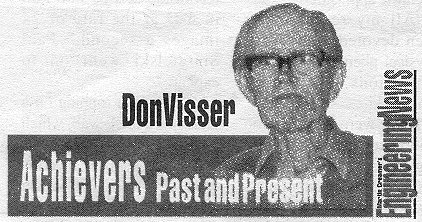
The Editors would like to thank Engineering News and author Don Visser whom have generously given permission to re-print this article from their edition of 7 March 1997.

Sir David Gill - Space-travel Forerunner
David Gill literally worked in the dark for years. It was only in 1888, nine years after his arrival at the Cape, that electric lighting was installed in his house and the observatory.
In a letter to a friend in England he wrote: "Our electric lighting was installed in February and is a complete success. All the instruments are now so illuminated that we are wondering how it is possible to observe without it."
Soon after this he was offered the position of professor of mathematics at Cambridge University but he refused the chair as he felt he could do more for astronomy by completing his work at the Cape.
In 1896 during one of his periodic visits to England he was awarded the honour of CB, Companion of Bath. Four years later a knighthood was conferred upon him. His knighthood was popularly received all over the world.
Meanwhile he never stopped adding instruments to his observatory. In 1896 the Treasury granted him funds to erect a transit circle at he Cape. Added to his excitement was the offer made to him by Frank Maclean, a brilliant English spectroscopist, of his large Victoria telescope equipped for spectroscopic and photographic work.
This Victoria telescope and the transit circle are still at the observatory in Cape Town. When all these instruments were installed, the observatory in Cape Town became the finest observatory in the Southern Hemisphere. It was now so equipped that the southern stars could be studied as effectively as the stars in the Northern Hemisphere. It must be remembered that not only was Gill the finest astronomer in the world but he was also the leading scientist in our country in his day. He was elected the first president of the SA Association for the Advancement of Science in 1902. This Association is still in existence and meets regularly.
Years of constant hard work finally caught up with Sir David, his health suffered and he was forced to retire from his directorship of the Cape observatory. His wife too had been frail in health for many years. They left the Cape in 1906 after 27 years unbroken service. During his years of retirement in London Sir David wrote his famous book History and Description of the Cape Observatory as well as filling his hours writing lectures and articles and receiving the many visitors who frequently called on him. In his leisure hours his favourite sports were golf and deer-stalking. He was a busy and happy man, active physically and mentally to the end.
In 1909 he was elected president of the Royal Astronomical Society.
Happiness was the keynote of his life and successes. He was happy in his work as an astronomer, happy and sincere in all his friendships and extremely happy in his married life. Of his married life he said, "We are a very Derby and Joan couple who like to be together as much as possible". Gill’s one source of unhappiness was his wife’s constant ill-health and her recurring illness caused him to suffer deeply.
Gill received the Royal Astronomical Society’s gold medal for the second time in 1908 and in 1913 he received the insignia of the Commandeur de la Legion d’Honneur. He also received the German Pour le Merite which was the highest award that Germany could bestow on him. When he received he news he turned to his wife and said: "Well I am an overrated man". He received more world-wide honours than any other astronomer of his day.
David’s seventieth birthday was his last. He received congratulatory telegrams and letters from all over the world. In reply to a cable from his staff at the Cape observatory he wrote: "One of the greatest joys of my old age is to watch the progress of the Cape Observatory and to find my old fellow workers are still as keen as ever and that the dear old observatory is still to the front and going on to higher and better things.
Gill and men of his calibre were the forerunners of our modern space travel and development. They were the men who paved the way by seeking out the secrets of the heavens and providing our scientists with all the required information about the stars and star distances. Knowledge of these facts is essential today before men and missiles can be projected into space with any feeling of confidence and security.
Gill died on January 24, 1914 and was buried in the town of his birth, Aberdeen. He had enjoyed a long and full life crowded with activity. Not only had he contributed to the world of science but he had also added to the sum of human knowledge.
Acknowledgements:
They Came to South Africa by Fay Jaff
The Dictionary of South African Bibliography
By the way…the next time you drive along Gill Street on your way to or from the Observatory, give a thought to the person after whom it is named!
Submitted ( with permission ) Eric Brindeau